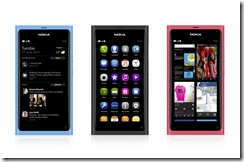Nokia today announced the local availability of the Nokia N9 smartphone in key markets across Middle East and Africa.
Alessandro Lamanna, Nokia’s VP of sales, Middle East and Africa said, “The Nokia N9, which will be available in select markets across the world, is perfectly suited for this region’s high-tech and style conscious consumer who demand best-in-class products.”
Recent figures from Gartner reveal that Nokia smartphones continue to be market leaders in MEA, claiming 41.9 per cent of the category market, consumers in the region clearly value and trust Nokia products.
The Nokia N9 introduces an innovative new design where the home key is replaced by a simple gesture: a swipe. Whenever the user is in an application, swiping from the edge of the display takes him home.
The three home views of the user interface are designed to give fast access to the most important things people do with a phone: using apps, staying up to date with notifications and social networks, and switching between activities.
With no need for a home key, the all-screen Nokia N9 makes more room for apps to shine. The 3.9-inch AMOLED screen is made from scratch-resistant curved glass. The polycarbonate body enables superior antenna performance. This means better reception, better voice quality and fewer dropped calls.
The recommended retail price of the device is between US$600-US$650 and is Nokia’s strongest attempt to date to regain a strong strategic foothold in the smartphone market, having seen stiff challenge from Apple, Samsung, RIM and LG in recent times.




